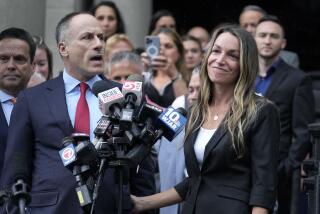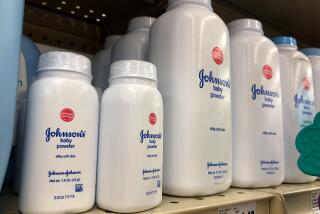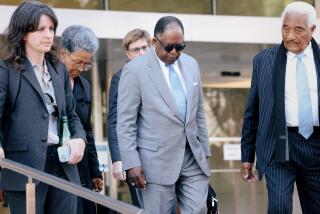Hung Jury Causes Mistrial in Tobacco Liability Case
- Share via
LEXINGTON, Miss. — With the jury hopelessly deadlocked, a mistrial was declared Friday in what might have been a landmark case against tobacco companies. Anti-smoking forces hoped the $16.5-million suit against American Tobacco Co. would put an end to the tobacco industry’s perfect record in fending off suits on behalf of smokers who either died or became seriously ill.
Circuit Judge Gray Evans announced that he had “very, very reluctantly” decided to dismiss the jurors in the four-week trial of a case brought by the family of Nathan H. Horton. Horton, a carpenter who suffered emphysema and lung cancer and who died a year ago at age 50, smoked two packs of American Tobacco’s Pall Mall brand a day for more than 30 years.
The jury, which deliberated for about 11 hours Thursday and Friday, apparently was split 7-5, falling short of the nine votes needed for a verdict. They deadlocked over whether American Tobacco was at least partly responsible for Horton’s death. The Hortons contended that American Tobacco breached an implied warranty that its cigarettes were safe for consumption and that the company neglected its duty to test its products once smoking and cancer were linked.
Evans said he did not ask which side the majority of the jury favored, and he directed jurors not to answer reporters’ questions. He said the case could be retried as early as this spring.
American Tobacco was expected by many courtroom observers to lose the case, and a lawyer for the company, James Upshaw, said he was happy with the outcome.
Ed Blackmon, another American Tobacco lawyer, said the jury’s deadlock “proved they’re not black racists.”
He was referring to speculation that Lexington, the seat of largely black and economically depressed Holmes County, was fertile ground for a lawsuit pitting a black family against a distant and vastly profitable corporation. An all-black jury was chosen for the case, although one juror who became ill was replaced by a white alternate.
Mississippi’s doctrine of “pure” comparative fault--which allows a negligent plaintiff to collect partial damages from a manufacturer found to share responsibility in a case--also appeared to favor the plaintiffs.
Don Barrett, an attorney for the Horton family, expressed disappointment with the mistrial but said the plaintiffs would continue their efforts.
“We came so close,” he said. Once “you slap the bully in the bar . . . you’re in for the whole fight.”
Some tobacco industry foes conceded that the mistrial was a blow to their hopes of cracking the aura of legal invulnerability enjoyed by the cigarette companies, which have successfully resisted product liability claims involving smokers for 30 years.
Richard Daynard, a law professor and co-founder of the Tobacco Products Liability project, a plaintiffs’ support group in Boston, said the case was “the first time they (industry lawyers) ever failed to get a verdict for the defendant. It’s a big step forward.”
But Donald Garner, a law professor at Southern Illinois University and an expert on tobacco litigation, called the result “a victory for the defendants. They prided themselves in never losing a lawsuit and I don’t think they care how they win.”
“The importance of this case,” Garner added, “is one of either energizing or demoralizing the plaintiff’s bar . . . and anything short of a victory is a win for the defendants. They’ll still be able to say they’ve never lost a trial or they’ve never compensated one of the customers they’ve killed.”
A victory by the Hortons, Garner said, would also have resulted in a “significant number of new filings” of claims against cigarette companies and “new energy poured into the old filings.”
About 120 suits are pending against cigarette firms, but new claims have slowed to a trickle because of unfavorable pretrial rulings in some cases and legal changes in California and other states that have made it more difficult to sue the industry. Another long-awaited cigarette trial--involving a suit by Antonio Cipollone against Philip Morris, Liggett & Myers and Loews Corp.’s Lorillard unit--is scheduled to begin Monday in U.S. District Court in Newark, N.J.
A lawsuit brought in Santa Barbara a little more than two years ago against R. J. Reynolds Tobacco Co. failed when medical experts could not conclusively prove that lung cancer caused the plaintiff’s death.
Following Friday’s declaration of a mistrial, as impromptu news conferences spread over the courthouse lawn, a shouting match erupted between Daynard and Upshaw as they stood in a ring of microphones and television lights. Upshaw, unleashed from a gag order on attorneys in the case, called Daynard “a fruitcake” before walking away.
The plaintiffs acknowledged that Horton was negligent for smoking but said he was hooked on the habit and could not have known about the toxic pesticides and flavorings that they said were in Pall Mall.
American Tobacco maintained that Horton was completely responsible for his decision to smoke and argued that the type of cancer that killed him was not associated with smoking anyway.
More to Read
Sign up for Essential California
The most important California stories and recommendations in your inbox every morning.
You may occasionally receive promotional content from the Los Angeles Times.













